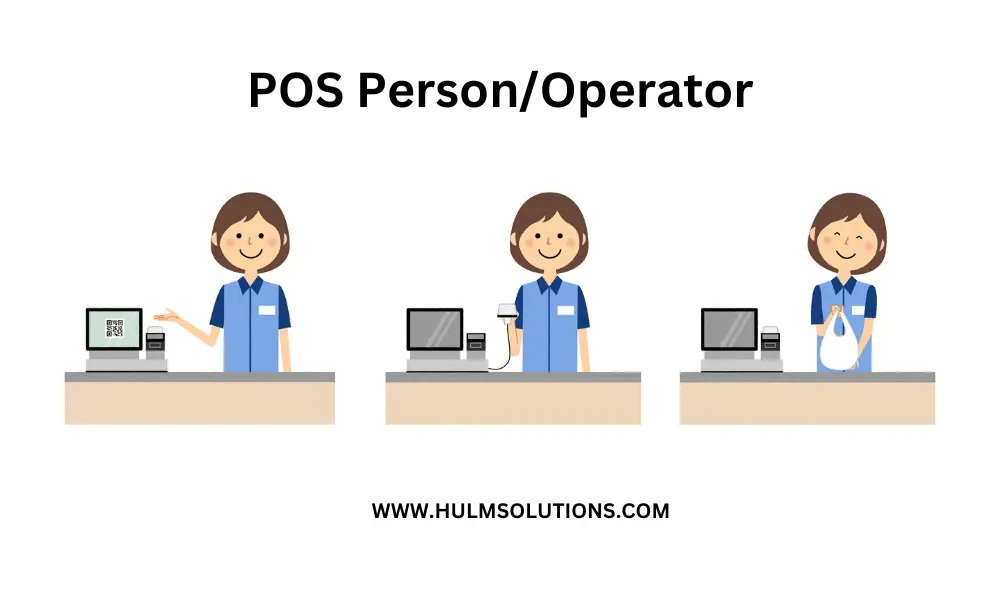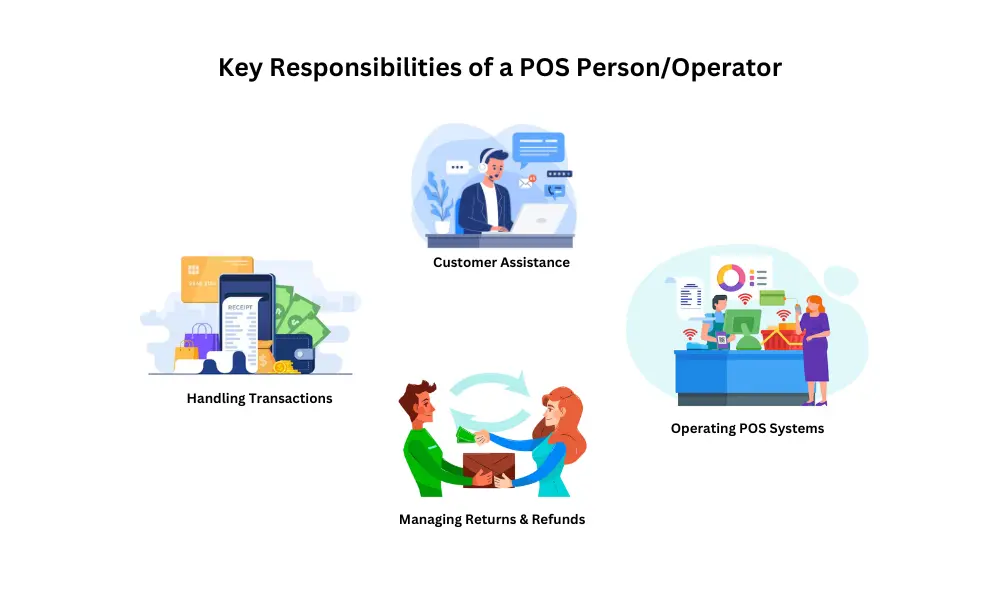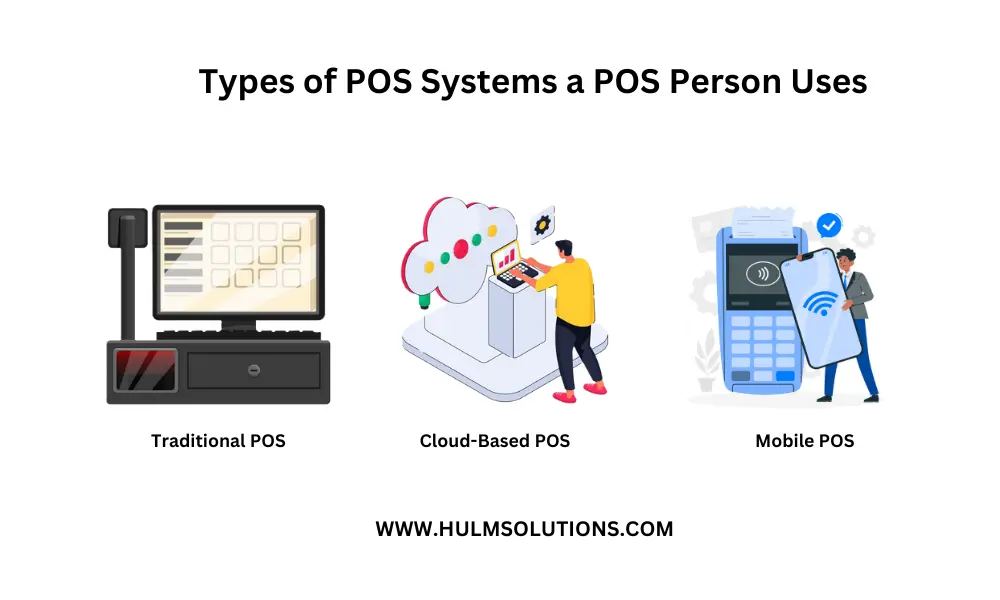Many people often ask, “What is a POS Person?” including operators, cashiers and sales associates, who play a crucial role in retail and hospitality. POS jobs are in demand and growing rapidly.
- Earnings: Point of Sale specialists earn $43K/year (Glassdoor), and operators make $48K/year (Salary.com).
- Employment: Retail employs 9.8% of the U.S. workforce, with many using point-of-sale systems.
- Market Growth: The point-of-sale market is to grow from $33B (2024) to $110B (2032) (Fortune).
A point-of-sale person plays a crucial role in handling POS transaction systems in various industries. They ensure smooth operations by managing payments, assisting customers, and operating Point of sale software efficiently.
This article provides a detailed guide on the responsibilities, skills, and importance of a point-of-sale person in different businesses.

What is a POS Person?
A POS person, also known as a Point-of-sale operator or associate, is a professional responsible for operating point-of-sale systems. They manage transactions, process payments, and customer service. The term Point of sale Person is a commonly used term for those working in retail, restaurants, and hospitality.
So if you are asking “What is a POS Person?”, the answer would be those frontline workers who ensure that purchase and payment processes happen without a hitch. Their job is about accuracy, customer interactions, and some general knowledge of the Point-of-sale system.
POS Person Meaning
POS person means: An individual responsible for managing and processing customer transactions at the Point-of-Sale system, ensuring accurate billing, payment handling, and providing efficient customer service during the checkout process. It is also known as a point-of-sale operator or associate.
To Learn: What is Point of Sale? Definition & Meaning Click Here!
Understanding POS: What Does It Stand For?
POS stands for Point of Sale. It is the location where a customer completes a purchase. A point-of-sale system includes both hardware and software, allowing businesses to process transactions efficiently.

Key Responsibilities of a POS Person
A Point of sale person is responsible for various tasks that ensure smooth business operations, here are their main responsibilities:
- Handling Transactions – Processing payments via cash, credit cards, and digital wallets.
- Customer Assistance – Answering questions about pricing, promotions, and store policies.
- Operating POS Systems – Using point-of-sale software for billing, inventory updates, and sales tracking.
- Managing Returns & Refunds – Handling exchanges and refunds as per store policies.
Skills Required for a POS Person
To be an efficient POS person, the following skills are essential:
- Technical Proficiency – Ability to operate point-of-sale software and hardware.
- Communication Skills – Clear and effective verbal interaction with customers.
- Problem-Solving Abilities – Handling transaction errors and difficult customer situations efficiently.

Types of point-of-sale Systems a POS Person Uses
Traditional Systems
- Used in large retail stores with fixed checkout terminals.
Cloud-Based Systems
- Enables remote access and multi-location business management.
Mobile Systems
- Operated on tablets or smartphones, commonly used in restaurants and pop-up shops.
Industries That Hire POS Persons
Retail Sector
- Supermarkets, clothing stores, and electronics shops.
Hospitality Industry
- Hotels, restaurants, and cafes.
Healthcare Sector
Hospitals and clinics where billing and patient transactions are required.
Why POS Person Important for a Business?
A POS person ensures accurate billing, smooth transactions, and excellent customer service. They help businesses prevent revenue loss and enhance customer satisfaction.
To Get: Best point-of-sale system for Small Businesses in Pakistan Click Here!
Challenges Faced by POS Persons
- Handling difficult customers
- Managing high transaction volumes during peak hours
- Technical issues with Point-of-sale software
How to Become a point-of-sale Person?
If you’re interested in learning what is POS person and how to become one, the process is simple:
- Basic education (High School Diploma or equivalent)
- Training in point-of-sale systems and customer service
Training for Point of Sale Persons
Many companies offer training on the job while many also give certifications for experience in operating point-of-sale systems.
Future of Point of Sale Jobs
As AI and automation transform the industry, the role of a POS person is evolving. However, the demand for skilled point-of-sale professionals remains high.
Understanding the Difference: Person or System
A point-of-sale system is a technology used to process transactions, while a Point-of-sale person is responsible for operating the system to ensure smooth business operations.
Conclusion
A POS person, also known as a point-of-sale operator or associate, plays an essential role in ensuring efficient transactions, accurate billing, and excellent customer service. If you’re wondering what is a POS person, they are professionals responsible for managing the sales process at the checkout counter. Their presence is vital in retail, hospitality, healthcare, and various service industries. Strong POS experience allows them to handle complex transactions efficiently, reducing errors and improving customer satisfaction.
Additionally, they are responsible for POS reconciliation, ensuring that the recorded sales match the actual transactions and preventing discrepancies. As technology advances, the role of a Point of sale person continues to evolve, offering new opportunities for skilled professionals in modern business environments.
Frequently Asked Questions
A POS person in retail handles customer transactions, payments, and sales operations using Point of sale software.
Technical knowledge of Point of Sale software, communication skills, and problem-solving abilities are essential.
The salary varies by industry, but Point of sale professionals typically earn between $25,000 and $40,000 annually, depending on experience.
Obtain basic education, training in point-of-sale systems, and customer service experience.
The future of point-of-sale jobs is evolving with AI and automation, but skilled Point-of-sale professionals remain in demand.